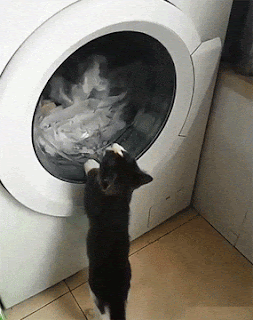Biographical
Name?
Violet Fox
Current
job?
As of June 2018, I work for OCLC as one of the editors of the Dewey Decimal Classification.
How
long have you been in the field?
I started working as a library student worker in 1995 and worked as a paraprofessional for seven years, but I was outside of libraries for a while (buy me a drink and ask me about my job as an internet content moderator). I got my MLIS in 2013 from the University of Washington iSchool.
How Do You Work?
What is your
office/workspace like?
The Dewey editorial team has been working at the Library of Congress since 1932, so in keeping with that tradition I work at LC, but in not the fancy Jefferson building—the boring building next door. I keep my cubicle pretty sparse. The two computers reflect the two organizations I work within: one belongs to OCLC, the other to LC.
How do you organize your days?
I use handwritten lists on scratch paper for daily tasks, color-coded Google
calendar entries for longer term tasks, and text documents for ideas for future
projects.
What do you spend most of your time doing?
There’s a lot of research, especially researching topics that
potentially need revision in the DDC schedules: recent subjects I’ve
investigated include sewage systems, coloring books, eunuchs, and BASE jumping.
The editorial team is only four people, so we work closely together to review
each other’s work and bounce ideas off each other. I’m still learning the ins
and outs of the editorial rules that govern the development of the DDC, so I
refer to those frequently.
What is a typical day like for you?
Things I might do in a typical day: answer a question from a
Dewey user, review another editor’s work, research one of my own projects,
investigate the history of a particular Dewey number, reach out to one of our
international partners for suggestions on how to address a particular problem.
Sort through email. Lots of phone/video meetings, since my boss and most of my
coworkers work in Ohio. I often have lunch or a coffee break with someone from
LC; it’s difficult to get to know anyone outside my tiny department, so I try
to be intentional about reaching out and making connections.
What are you reading right now?
I recently finished Naming
Nature: The Clash Between Instinct and Science by Carol Kaesuk
Yoon. I’ve been reading a lot about classification in a variety of fields;
Yoon’s book is a popular science discussion of the history of scientific
taxonomy and how it differs from folk taxonomy.
I’ve outsourced all my memory of books I’ve read to my GoodReads account,
which leads to moments of panic as I totally blank when anyone asks what I’ve
been reading.
What's the best professional advice you've ever received?
I’ve heard Dr. Nicole Cooke (@LibraryNicole) speak a few times and have walked away energized and inspired
by her focus on figuring out what you want your legacy to be. Reflecting on
that periodically helps me focus my energy on the things that matter to me
(e.g., making the case for the value of metadata, being encouraging to new
library folks, bringing transparency to my work).
What have you found yourself doing at work that you never
expected?
Defending Dewey (the classification, not the man)
Inside the Library Studio
What is your favorite word?
I love learning new color words. Recent favorites are corbeau (a
very dark shade of green, almost black) and eau de Nil (a pale
green).
What is your least favorite word?
Every single word that comes out of the mouth of the man
currently living in the White House.
What profession other than your own would you love to attempt?
Throughout the years I’ve taken a few personality tests that
suggest likely careers based on my temperament. Usually number two is
librarian, and for whatever reason, number one is always X-ray technician. So I
should probably give that a go if this library thing doesn’t work out.
What profession would you never want to attempt?
Marketing.
Everything Else
What superpower do you wish you had?
Just the regular power of not having to struggle with
depression. That’d be neat.
What are you most proud of in your career?
Whatever I’ve been able to contribute towards building
communities of generous and compassionate people in the overlapping circles of
librarianship that I inhabit.
If you're willing to share, tell about a
mistake you made on the job.
Honestly, I don’t even—where would I
start? I’ve had entire jobs that were mistakes.
Most of my mistakes are the result of procrastinating, which is
absolutely my worst trait. Not wasting time
putting off small tasks is the life lesson I never seem to learn.
When you aren't at work, what are you likely
doing?
Often organizing zine librarian stuff or, occasionally, critlib
stuff. Occasionally writing Wikipedia
articles. Thinking about the next issue
of my zine about roadside attractions. Sending snail mail. I moved halfway
across the country for this job, so a good amount of my time is spent traveling
to visit my spouse, or counting the days until our next visit.
Who else would you like to see answer these
questions?
















